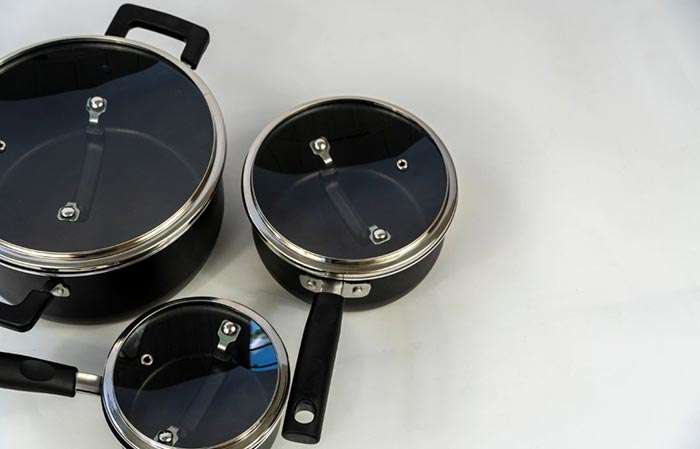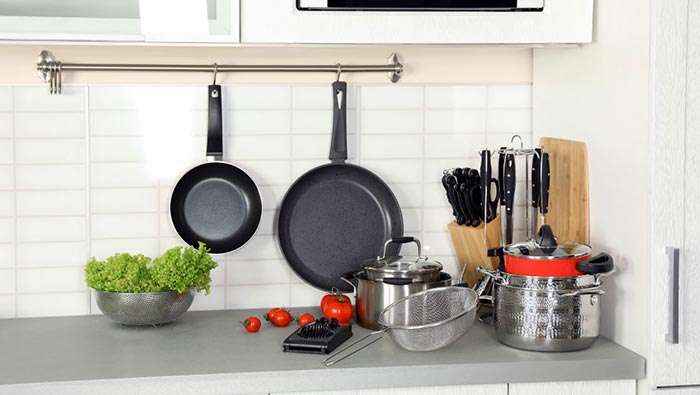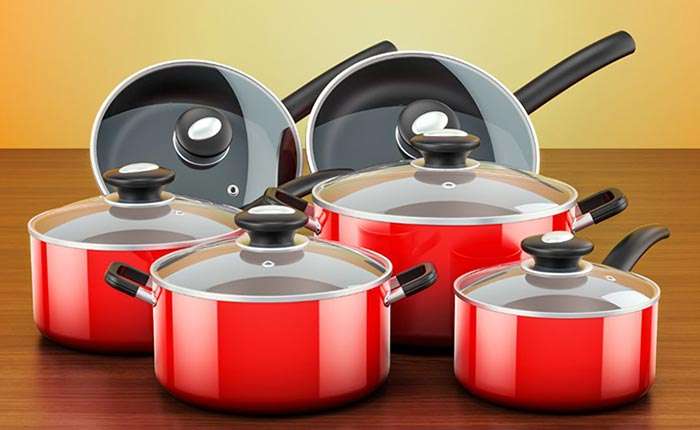Table of Contents
In your daily lives, kitchen accessories play a vital role in feeding you and facilitating service delivery. While most of you are very cautious about the ingredients you use in cooking, your cookware effects on health rarely cross your minds. The market has a variety of cookware such as non-stick pans and aluminum cookware which claims the safest cookware and easy to use.
On the other hand, new studies have expressed anxiety regarding dangerous health conditions associated with different kinds of cooking utensils. This article will discuss some of the safest cookware and offer advice on how one can choose wisely when it comes to this type of kitchen accessory.
Key points:
Let’s check first some key takeaways from this article on the safest cookware to get a clear overview.
- To foster a safe and healthy cooking practice, the choice of the right cookware is of great importance.
- In terms of cookware, natural ingredients such as stainless steel, cast iron, or ceramic are generally thought to be the most secure.
- It means that you should be deterred from harmful chemicals in cookware such as PFOA and PFAS.
- The way utensils are used and handled can also add to their safety.
- Cookware usage should be minimized to avoid metals like aluminum and copper which are hazardous for humans by choosing other safer substitutes.
- You may investigate different brands before buying your preferred one.
Types of Cookware
Regarding your health, what kind of cookware you use can make a great difference. You may think of many options on the market like non-stick and aluminum as less safe. This section discusses different types of cooking utensils and their possible health side effects.
1. Stainless Steel: This is one of the safest cooking accessories available today. It is strong, does not react with foodstuff, and does not release any harmful gases when heated up. Apart from that it’s also non-sticky which makes it easy to clean.
2. Cast Iron: The cast iron is known to be lasting and its ability to hold heat for long periods is what makes it distinctive. Small amounts of iron may leach into the food thus beneficial for people with iron deficiencies. However, using too much may result in poisoning, so try only cast iron in small portions.
3. Porcelain: These kinds are constructed from natural components and contain no dangerous substances at all. They don’t poison your meal because they do not respond to it at all times; nevertheless, they are delicate products that chip easily and hence should be handled carefully.
4. Glass: Non-toxic and non-reactive, glass cookware is safe to use when cooking because of this aspect. That means it retains heat well and can be put in the oven. Nevertheless, it breaks easily under extreme temperature fluctuations.
5. Non-stick: One kind of cookware of this type is equipped with a covering that prevents food from sticking while being cooked. However, non-stick coatings may contain PFOA and PFAS which could be dangerous to human health. It’s better not to use non-stick cookware too frequently because they should also never be scraped with metallic utensils.
6. Aluminum: Aluminum pots feel light and transfer heat rapidly but they also release some small traces of metal into food when cooking with them. High levels of aluminum in the human body have been connected with neurological disorders so one must avoid using this substance excessively.
7. Copper: Good heat conducting ability and sturdiness are associated with copper-made cookware. Nevertheless, the cooking surface may leach copper into food when not coated, resulting in health issues. The best option is to choose copper cookware with a non-reactive lining.
8. Enamel: Cooking pots made of enamel are created from cast iron or steel and then coated with a layer of porcelain enamel which is heatproof. This makes it safe to cook in because there are no toxic materials or substances involved in the process.
9. Carbon Steel: Carbon steel cookware like cast iron holds heat well and is also durable. However, carbon steel requires seasoning before use just as cast iron does and it may react with acidic foods.
10. Granite: To make granite cookware, a blend of natural minerals is mixed with a ceramic coating that stops food from sticking on the surface while it is being cooked. However non-toxic as well as free from PFOA and PFAS, its non-stick coating could wear away in time leaving granite sticky.
11. Blue diamond: Non-sticky pans that are made of ceramics containing diamond instead are known as Blue Diamond pans because diamonds have infused them to give them strength and durability; although care must be taken since such pans could still release some amounts of PTFE particles when exposed to high temperatures
12. Caraway: Caraway’s ceramic cooking pots and pans are coated with non-stick layers that are free of PFOA, PTFE, lead, and other toxic substances.
13. Anodized: Anodized cookware has been anodized through the electrolytic process to make its surface harder; thus, durable and rust resistant at least.
14. Tramontina: The Tramontina cookware is constructed from strong aluminum metal that is heavy gauge which also has an added layer of a non-stick that does not have cadmium, lead, or PFOA.
15. Anolon: This Anolon set contains hard-anodized aluminum with a Teflon-coated surface making it safe for use purposes while cooking daily meals.
Therefore, always remember to look for labels on your cookware and investigate the components before buying them to ensure they are safe for use. So continue cooking healthy by being informed when choosing better alternatives too.
Is aluminum cookware safe?
Many households prefer aluminum cookware because it is affordable and popular because of its lightweight as well as superior heat conduction. However, there has been anxiety regarding its health implications due to the possibility of leaching traces of aluminum into food substances cooked in it. The body does tolerate small amounts of aluminum but overconsumption has been connected with neurological effects.

Consequently, it is advisable to minimize the use of aluminum cooking ware and instead go for safer alternatives like stainless steel, cast iron, or ceramic cookware. In case you use this kind of cookware ensure that you do not cook acidic food in it or dispose of it when it chips to prevent health issues that may arise from using such a material.
Is stainless steel cookware safe?
The most safest and endurable cooking utensil of all is stainless steel. It is chosen by many health-conscious people since when heated, it doesn’t react or let out any dangerous substances into food.
Nonetheless, the quality and grade of stainless steel used in cookware should be closely watched as some cheaper versions may have elements such as nickel or chromium which can be a poison in a few cases. As long as you use and maintain it well, Stainless steel is generally safe and dependable for cooking purposes.
Is copper cookware safe?
The popularity of copper pans is due to their high conductivity and aesthetic appeal. However, others have expressed worries about its potential health hazards. That is because cooking in uncoated copper cookware can cause food to pick up some small amounts of copper which might be poisonous if taken in large doses.
To avoid this, you need to enclose your copper cookware using a non-reactive material such as stainless steel or tin. Alternatively, it would be safer to use stainless steel or ceramic pots rather than those made of copper for cooking.
Is enamel cookware safe?
Enamelware is formed from steel or cast iron and then covered with a heat-resistant glassy layer of porcelain enamel. This produces an innocuous, non-responsive surface that makes it safe to cook in. Even so, the user should be careful while handling enamel cookware given that its coating can easily peel or crack letting the metal inside become exposed.
Instead, using metal utensils on enamel cookware needs to be avoided as this may cause damage to the utensil. All in all, provided it is used properly with constant maintenance in mind, enamel cookware is a safe and durable choice for cooking.
Is ceramic-coated cookware safe?
In recent years, ceramic-coated cookware has become a favorite choice for many people because of its non-toxic and non-reactive nature. It is usually made from sand, clay, and other natural materials for a more secure option compared to the traditional nonstick pan.
However, it must be noted that ceramic cookware’s quality as well as its durability may vary and may have some trace amounts of harmful chemicals. To ensure maximum safety, one should consider purchasing ceramic cookware from reliable brands and handle it with care.
Is carbon steel cookware safe?
In terms of durability and heat retention, carbon steel cookware is comparable to cast iron. Nevertheless, it also calls for seasoning before use just like cast iron cookware does, and may interact with acidic foods. Furthermore, there may be small amounts of lead in the carbon steel; this is hazardous if taken too much.
To avoid this, it is suggested that we minimize our use of carbon steel utensils and prefer other safer ones such as stainless steel or ceramic utensils. In addition to that fact, safety can be ensured if one properly handles and maintains his or her carbon steel wares.
Are cast iron cookware safe?
This low-cost cookware is an old-fashioned choice for many kitchens because of its long life and heat absorption capacity. It can release some iron into food. However, excessive intake of iron is dangerous.

Proper seasoning before use and handling this ware with care are the best ways to make sure it is safe for cooking. Such precautions include reducing cast iron cookware usage and going for other types like stainless steel and ceramic ones instead.
Is granite stone cookware safe?
Non-toxic and non-reactive, granite stone cookware is made of a blend of natural minerals and ceramic coating that does not stick. However, the granite may stick as time goes by while the non-stick coating could eventually wear off.
Additionally, some kinds of granite stone cookware still have PFOA and PFAS, harmful substances often used in non-stick pans. One should consider researching reputable brands or selecting safer options like stainless steel or ceramic cooking pots.
Is glass cookware safe?
Glass utensils are not poisonous or reactive, making them an ideal material for cooking and storing food. It is also quite simple to wash and maintains heat so it can be used in the oven as well. Nevertheless, glass cookware might break into pieces if thrown from one extreme temperature to another; thus, it should be handled with caution.
Besides that, using metal tools on glass dishes is not advisable because this may scratch or destroy them completely. All in all, glass utensils are relatively safe and comfortable alternatives for low-risk cooking.
Is nonstick cookware safe?
Non-stick cookware, also referred to as Teflon cookware, is coated to prevent foods from sticking. Yet the non-stick coating may have harmful chemicals such as PFOA and PFAS that are associated with health issues. Although several countries have phased out these substances from use, certain newer types of non-stick cookware still possess them.

The best thing is to make minimal use of nonstick pans and not to employ metal utensils when cooking with them. As an alternative, it is suggested to examine options like ceramic or stainless steel wares that guarantee secure cooking sessions.
Is blue diamond cookware safe?
Non-stick ceramic cookware, like blue diamond cookware, but with the added strength of diamond in the coating. This makes it less scratch and wear-resistant, but it can still have low levels of PTFE when it gets too hot.
To stay safe, research should be done before looking into various brands of blue diamond cookware. It is also advisable to minimize its use and consider safer options such as cooking using stainless steel or ceramics daily instead.
Is Caraway cookware safe?
Caraway is a modern brand of non-toxic and non-stick cookware that lacks destructive substances such as PFOA, PTFE, lead, and other pollutants. With a ceramic coating, it can be used in the oven too; hence its popularity as a safer cooking method.
Nonetheless, proper maintenance is necessary to avoid any scratches on this non-stick covering. Always look for information and pick reliable brands when going for caraway cookware because you want to be sure of your safety while using them.
Is anodized cookware safe?
Anodized cookware has been treated through an electrochemical process to harden the surface, making it resistant to rust and corrosion. This also creates a non-stick surface, making it a popular choice for cooking. However, it is crucial to choose anodized cookware that is free from harmful chemicals such as PFOA and PTFE.
It is also recommended to avoid using metal utensils on anodized cookware to prevent any damage to the coating. With proper care and consideration, anodized cookware can be a durable and safe option for cooking.
Is tramontina cookware safe?
Tramontina cookware is made of heavy-gauge aluminum and coated by a non-stick layer of PFOA, PTFE, lead, and cadmium-free. This makes it safe and long-lasting for everyday use. It’s worth noting that some types of tramontina cookware still might have minute quantities of other metals like nickel that can cause health problems in a few rare cases.
To ensure the highest safety possible, it is recommended that you handle and maintain carefully this cookware, as with any cookware.
Is Anolon cookware safe?
Anolon cookware has hard-anodized aluminum construction with a non-stick coating which is also PTFE free making it safe to use and durable. However, purchasing Anolon cookware should be done from reputable brands whose quality standards and safety vary.
It is important however to keep handling it gently so as not to destroy the non-stick coat on it. With proper use and maintenance, Anolon Cookware can be an excellent choice for everyday cooking.
Most safest cookware?
The safest cookware is subjective and depends on individual preferences and health issues. Nonetheless, some of the strongest contenders for the crown of “safest cookware” are stainless steel, cast iron, and ceramic cookware. These types are generally classified as non-toxic and non-reactive; thus they can be used in everyday kitchen applications safely without any health risks. In addition, all cooking vessels must be properly handled and maintained; furthermore, non-stick surfaces should not be scratched with metallic utensils to prevent endangering a person’s well-being.
When looking for safe cookware, one should also consider whether it contains hazardous chemicals such as PFOA and PFAS commonly found in non-stick pans. It is also advisable to identify trustworthy manufacturers and handle and replace broken tableware appropriately to ensure maximum safety measures are achieved. However, the best cooking ware for your home will depend on your specific requirements and fears but options like stainless steel, cast iron, and ceramic can provide a good starting point.
Remember, it is essential to carefully research and choose reputable brands and handle and maintain all cookware properly to ensure maximum safety in your kitchen. Thus, you can choose the safest cookware anywhere in the world. The above discussion will surely help you to find the best one and the safest cookware.
Conclusion
Your health and well-being can be significantly affected by selecting the safest cookware for your kitchen. The market is flooded with several alternatives but you must regard natural and non-toxic materials as paramount, on the other hand, shun dangerous compounds such as PFOA and PFAS.
Proper handling of all cooking utensils should be observed including repair or replacement of any damaged areas to prevent any possible health risks. Think about the factors mentioned above and make thoughtful choices to have a safe cooking experience for yourself. Surely, it will find the safest cookware for you and your family.
How to Cook Couscous in a Rice Cooker
FAQ (Frequently Asked Questions)
Here are some of the Frequently Asked Questions and the answers from the experts to help you.

